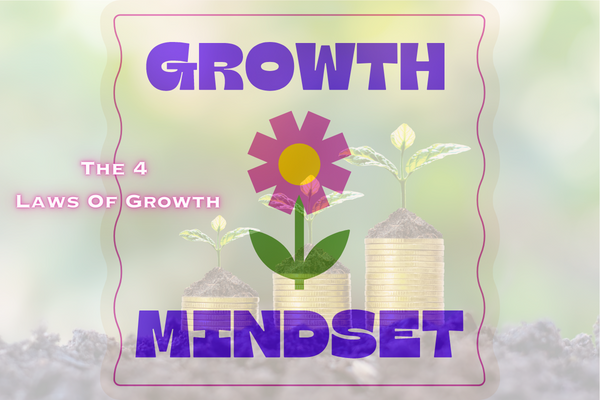Exploring the 4 Laws of Growth To Unleash Your Full Potential
Personal development and self-improvement are indispensable elements of achieving success and living a fulfilling life. However, many individuals struggle to tap into their full potential and unlock their true capabilities. Fortunately, the field of psychology and personal growth has identified four fundamental laws of growth. This comprehensive and in-depth blog post will explore each of these laws, providing a thorough overview and actionable advice for implementing them in your life.
Law 1: The Law of Belief
The Law of Belief, a powerful tool that goes beyond wishful thinking, has the potential to transform our lives in unimaginable ways. By understanding and harnessing this principle, we can unlock our true potential and achieve remarkable accomplishments. Belief can either propel you toward success or hinder your progress. By understanding and harnessing the Law of Belief, you can transform your mindset to pave the way for growth and self-improvement.
In our pursuit of personal development and success, we often overlook the enormous impact that our beliefs have on shaping our reality. In this blog post, we will explore the fundamental principles of the Law of Belief, discuss real-life examples of individuals who embody its power, analyze psychological studies supporting its effectiveness, and provide practical strategies to cultivate a positive and empowering belief system.
The Law of Belief posits that our conscious and subconscious beliefs shape our thoughts, emotions, actions, and ultimately, our outcomes. Simply put, we attract into our lives that which we believe to be true. Our beliefs act as lenses through which we perceive the world, either empowering or limiting our potential
Key Points:
– Beliefs shape our thoughts, feelings, and actions, thereby influencing our outcomes.
– Adopting a growth mindset, as proposed by Carol Dweck, can empower you to embrace challenges and see setbacks as opportunities for growth.
– Build self-confidence by reflecting on your past achievements and creating a positive self-affirmation routine.
– Surround yourself with positive influences, such as supportive friends, mentors, or motivational literature.
Evidence and Examples:
– In a study conducted by Dr. Albert Bandura, individuals with strong self-efficacy beliefs were more likely to pursue challenging goals and recover from failures.
– Roger Federer, a tennis icon, attributes his success to a strong belief in his abilities and an unwavering determination to improve.
Law2: The Law of Desire – Unveiling the Power within You
This law explores the innate human need to fulfill our desires and the transformative impact it has on our lives. In the realm of personal development, there exist numerous universal laws that govern our thoughts, actions, and ultimately, our destinies. These laws are deeply rooted in our psychology, influencing our behaviour and shaping our reality.
Desire is the driving force behind human motivation. It is the spark that ignites our imagination and propels us forward. From the simplest cravings for food and water to the complex desires for success and love, our desires shape our aspirations and fuel our actions. The Law of Desire states that our thoughts and actions are fundamentally guided by our core desires. By understanding and harnessing the power of this law, we can tap into our true potential and manifest our dreams into reality.
Having a burning desire and passion for what you want to achieve is the cornerstone of personal growth. When your desires are aligned with your values and interests, you unlock a limitless source of motivation and drive.
Key Points:
– Identify your core values and passions to align them with your goals. This alignment will fuel your motivation and sustain your efforts during challenging times.
– Cultivate a growth-oriented mindset by setting ambitious but realistic goals that stretch your capabilities.
– Create a clear vision of your desired future and visualize it regularly to reinforce your motivation and stay focused.
– Surround yourself with like-minded individuals who share similar goals and aspirations.
Evidence and Examples:
– A study published in the Journal of Personality and Social Psychology found that individuals who pursued goals aligned with their intrinsic desires reported higher levels of well-being and life satisfaction.
– Elon Musk, the CEO of SpaceX and Tesla, attributed his success to an unwavering desire to revolutionize industries and solve global challenges.
Law 3: The Law of Action
The Law of Action emphasizes the importance of actively pursuing our goals and dreams. It is through action that we turn our ideas and intentions into reality. This law teaches us that without action, nothing can be accomplished, and our dreams will remain mere fantasies. This law is grounded in the understanding that our thoughts alone are not enough to bring about the desired results. While it is essential to have a clear vision and a positive mindset, it is equally important to take the necessary steps toward our goals. Action is the catalyst that propels us forward and transforms our dreams into tangible achievements.

One of the fundamental principles underlying the Law of Action is the concept of cause and effect. Every action we take produces a corresponding result. By taking the right actions, we can create a positive chain reaction that leads to success and personal growth. This law encourages us to be proactive rather than passive observers in our own lives.
No growth can occur without taking intentional and consistent action. The Law of Action emphasizes the importance of stepping out of your comfort zone and actively engaging in activities that align with your goals.
Key Points:
– Break your goals down into smaller, manageable tasks to overcome overwhelm and facilitate progress.
– Prioritize your actions by focusing on high-value activities that yield the most significant impact towards your objectives.
– Embrace the concept of deliberate practice, dedicating time and effort to mastering skills and continuously improving.
– Embrace failure and setbacks as learning opportunities, adjust your approach, and persist in the face of adversity.
Evidence and Examples:
– Research by Dr. Anders Ericsson shows that deliberate practice, characterized by focused efforts to improve specific skills, is the key to expertise.
– Thomas Edison, the inventor of the light bulb, once said, “I have not failed. I’ve just found 10,000 ways that won’t work.”
Law 4: The Law of Reflection
The Law of Reflection is a powerful principle that governs our interactions with others and influences the outcomes we experience in our relationships, both personal and professional. This law essentially states that what we see in others, whether it be positive or negative traits, is often a reflection of our own inner world.
Self-reflection is a powerful tool for personal growth. By taking time to evaluate your progress, learn from your experiences, and adjust your strategies, you can accelerate your development and maximize your potential.
The Law of Reflection teaches us that every relationship or encounter is an opportunity for self-growth and self-awareness. Instead of blaming others for our feelings or circumstances, it encourages us to take responsibility for our own thoughts, emotions, and actions. By understanding that what we see in others is a reflection of ourselves, we can gain valuable insights into our own strengths, weaknesses, and areas for personal development.
Applying this law in our daily lives can lead to profound transformation and greater harmony in our relationships. When we encounter someone who triggers negative reactions in us, rather than becoming defensive or engaging in a blame game, we can take a step back and ask ourselves, “What is it about this situation or person that is touching a nerve within me?” This pause for self-reflection allows us to gain a deeper understanding of our own wounds, limiting beliefs, or unresolved issues that need healing.
Key Points:
– Practice regular self-reflection by setting aside dedicated time to journal, meditate, or engage in introspective activities.
– Identify your strengths and areas for improvement, allowing you to focus your efforts on areas that will yield the most growth.
– Seek feedback from mentors, coaches, or trusted individuals who can provide valuable insights and perspectives.
– Celebrate your successes and acknowledge your achievements to reinforce positive behaviors and maintain motivation.
Evidence and Examples:
– A study published in the Academy of Management Learning and Education journal found that individuals who engaged in regular self-reflection reported higher levels of personal growth and professional development.
– Warren Buffett, one of the most successful investors in the world, attributes his success to the habit of regularly reflecting on his investment decisions and learning from his mistakes.
Concluding Comments On The Four Laws Of Growth
By embracing and implementing the four laws of growth in your life, you can unleash your full potential, achieve personal development, and experience transformative success. The Law of Belief, Desire, Action, and Reflection provides a comprehensive framework for continuous improvement and self-empowerment. You do however need to take full cognizance of the journey toward personal growth that begins with a belief in your abilities, a burning desire for success, intentional action, and regular reflection. Let these laws guide you on your path toward unlocking your full potential and living a life of fulfillment and achievement.
===========================================================














